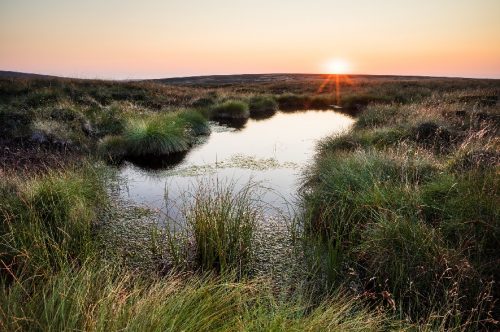Green projects given support to attract private sector investment

Two North West projects aimed at protecting and restoring valuable habitats are among four that will receive government funding.
The pilot scheme is aimed to encourage sustainable private sector investment in the country’s natural environment.
Defra, the Environment Agency (EA), Esmée Fairbairn Foundation (EFF) and Triodos Bank UK have formed a collaboration to support environmental projects to create sustainable funding models.
Having been sourced and evaluated by Triodos Bank UK, the projects will receive grant funding from Defra, the EA and EFF to support their development, complete business plans to attract private sector investment, and deliver long-term environmental benefits and sustainable financial returns.
The two North West projects are the Rivers Trust’s work on natural flood management in the Wyre catchment in Lancashire and Moors for the Future Partnership’s restoration and conservation of peatlands in the Pennines.
Emma Howard Boyd, chair of the Environment Agency, said: “In England we are increasingly seeing new extreme weather accelerate from wettest to driest and back again – restoring nature is key to managing this.
“You can’t put a price on nature, but investing in its recovery can generate a steady return and will make the UK economy more clean and resilient.
“These projects are designed to attract investment into local economies while developing models for businesses to use and scale up around the world.”
Environment Minister Rebecca Pow said: “The UK is taking a leading global role in tackling climate change and biodiversity loss, but given the scale of the challenge ahead it is crucial that environmental projects have the tools they need to attract private sector investment alongside our government support.
“Ensuring we have a green recovery from coronavirus will be especially important at this time, and this collaboration provides vital financial expertise and support to create funding models which can be used by other projects up and down the country.”
The River Wyre scheme is focused on the use of natural flood management, including the building of leaky dams, the creation of bog, and the rewetting of peat, on 70 hectares of the River Wyre catchment by the Rivers Trust to help reduce the frequency of flooding for a number of properties in Lancashire.
At the same time as reducing flood risk, these natural flood management schemes will create new habitats for wildlife and help to mitigate climate change through the storage of greenhouse gases in the newly created wetlands and peatlands.
The seed funding will allow The Rivers Trust to work with the Wyre Rivers Trust, Environment Agency, United Utilities, Triodos Bank UK, Co-op Insurance and Flood Re, to develop a financial instrument that would allow upfront investment from the private sector to be reimbursed by the beneficiaries of a healthier environment.
Mark Lloyd, chief executive of The Rivers Trust, said: “At a time when we are facing a climate emergency we must find new ways to invest in recovery of the natural processes that protect and support us, at a scale and pace that can make a difference. Hard engineering alone will not address our future flood risk challenges and must be supplemented by natural solutions.
“We believe that by implementing natural flood risk management features at scale, we could see significant financial returns from a better river environment. We expect this pilot to lead to future natural capital investment and build a credible case for green investment to restore our river landscapes.”
Meanwhile, work to restore peatlands in the region is expected to boost the eco system.
Peatlands have a vital part to play in tackling climate change, storing more carbon than all other types of vegetation in the world combined, and damage to peatlands is a major source of carbon emissions.
The peatlands of the South and West Pennines are some of the most degraded in uplands in Europe, and as well as being damaged in the past by the coal-fired industry in Manchester and Sheffield, they are facing future pressure from hot Summers and wet Winters due to climate change.
The Moors for the Future Partnership is already working to restore and conserve peatland in the area, but needs to attract greater investment to carry out this work on a larger scale to protect more of this vital habitat.
It is hoped this project will be successful in developing a range of returns, including financial, for investors.
Christopher Dean, head of programme delivery from the Moors for the Future Partnership, said: “The partnership has been operating for 17 years and has transformed huge areas of bare and eroding peat.
“As these peatlands are at the forefront of the effects of climate change, there is an urgent need for restoration to continue so that we can deliver full ecosystem service returns.
“This pilot is a natural successor to the landscape-scale work that has already been achieved and will allow the partnership to pioneer the development of the next generation of sustainable financing for vital peatland conservation work.”








